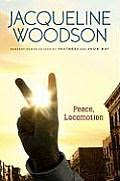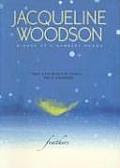"Sometimes, when I'm sitting at my desk for long hours and nothing's coming to me, I remember my fifth grade teacher, the way her eyes lit up when she said, "This is really good." The way, I -- the skinny girl in the back of the classroom who was always getting into trouble for talking or missed homework assignments -- sat up a little straighter, folded my hands on the desks, smiled and began to believe in me."
According to Jacqueline Woodson's website, none of the four books I read during my Jacqueline Woodson Marathon are autobiographical. It's probably just unavoidable, though, to find bits of truths from the author's life in each one.
For instance, the opening quote could be Lonnie (aka Locomotion) or Frannie (in Feathers) talking. Although she was born in Columbus, Ohio, Woodson has lived in Brooklyn since she was 7 years old. City life features strongly in all four of the books I read. She speaks ASL, which is important in Feathers, as Frannie's brother Sean is deaf. Music is very important to Jacqueline Woodson, and the music and lyrics of Tupac Shakur are central to the plot of After Tupac and D Foster. Woodson sometimes sits on the stoop to write. The narrator and her friends Neeka and D in After Tupac and D Foster spend hours (in all weather) on the front stoop. And if she couldn't write, Woodson admits to a desire to play for the NBA for the Knicks. One of Neeka's brothers in After Tupac and D Foster goes from basketball crazy to a basketball scholarship to Georgetown over the course of the book.
 Locomotion
Locomotionby Jacqueline Woodson
G.P. Putnam's Sons, 2003
review copy: public library
"Lonnie's voice was in my head." This novel in verse is told in the voice of a fifth grade boy who is in foster care. His sister is in different foster family. Writing poetry is lifesaving for Lonnie. This book would be interesting paired with Love That Dog by Sharon Creech.
by Jacqueline Woodson
G.P. Putnam's Sons, 2009
review copy: provided by the publisher
"This book started out being about one kind of peace and then became about the many ways we search for and eventually find peace." In this book, Lonnie writes letters to his sister in an attempt to keep safe the memories of their childhood (both before their parents were killed in the fire and now that they are living in two different foster families). Both Lonnie and his sister Lili are becoming more and more a part of their separate foster families and they have to find peace with that. One of Lonnie's foster brothers comes home from the war without part of one leg -- he has to find peace with his new body. Lonnie's new friend Clyde struggles to be accepted for who he is -- another way of finding peace.
by Jacqueline Woodson
G.P. Putnam's Sons, 2007
review copy: public library
"...I wanted to write about the many ways people find Hope in the world." This book has a complicated mix of themes: race, organized religion, the holiness of living without organized religion, false assumptions, bullies, and, in a surprise plot turn, mixed-race adoptions.
 After Tupac and D Foster
After Tupac and D Fosterby Jacqueline Woodson
G.P. Putnam's Sons, 2008
review copy: public library"I think Tupac was an amazing activist..." Two strands are woven in this book. First, there is Tupac Shakur -- his music, his lyrics, his life (and his mother's life) as an activist for disenfranchised black youth. And then there is family -- tight city neighborhood family, foster family, families that include a gay brother who is wrongly jailed for a crime he did not commit.
As a middle class white woman who grew up on a small rural town, I read Jacqueline Woodson's books from the outside looking in. The worlds she writes about are as foreign to me as another country. She writes with language I do not hear in my everyday life, and the urban world in which her characters live is far different even from the small city in which I now live. Reading these four books made it abundantly clear to me how few books there are in my classroom library or in our school library that are written from anything but a white middle class world view. After Tupac and D Foster is a bit too YA for my 4th grade classroom, but the other three are on my to-buy list.




Mary Lee,
ReplyDeleteI am convinced I'm Ms. Woodson's favorite fan. I have several of her books in our library. I promote her work every opportunity I can and I just blogged about her for our CORA Diversity Roll Call meme.
She has works for younger readers. My first read was Madison at Blue Hill. I am African American but that doesn't mean I relate to hip hop and Ms. Woodson created a brige for me. After Tupac and D Forster resonates with me for other reasons and it is popular in our library. I loved Locomotion and I can't wait to read Peace, Locomotion.
Happy to see your post. Thanks.
Thanks for such a wonderful introduction to Ms. Woodson. What a great collection of reviews and a tribute, too.
ReplyDeleteI love all of Ms. Woodson's work, but the Lonnie Collins books are something special. He's such a joyful, thoughtful character. Glad you had a chance to read!
ReplyDelete